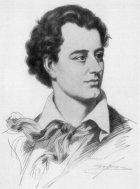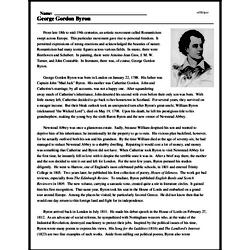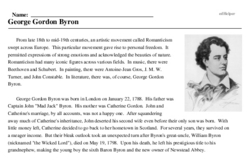George Gordon Byron
Byron
Reading Comprehension for January 22
From late 18th to mid-19th centuries, an artistic movement called Romanticism swept across Europe. This particular movement gave rise to personal freedom. It permitted expressions of strong emotions and acknowledged the beauties of nature. Romanticism had many iconic figures across various fields. In music, there were Beethoven and Schubert. In painting, there were Antoine-Jean Gros, J. M. W. Turner, and John Constable. In literature, there was, of course, George Gordon Byron.
George Gordon Byron was born in London on January 22, 1788. His father was Captain John "Mad Jack" Byron. His mother was Catherine Gordon. John and Catherine's marriage, by all accounts, was not a happy one. After squandering away much of Catherine's inheritance, John deserted his second wife even before their only son was born. With little money left, Catherine decided to go back to her hometown in Scotland. For several years, they survived on a meager income. But their bleak outlook took an unexpected turn after Byron's great-uncle, William Byron (nicknamed "the Wicked Lord"), died on May 19, 1798. Upon his death, he left his prestigious title to his grandnephew, making the young boy the sixth Baron Byron and the new owner of Newstead Abbey.
Newstead Abbey was once a glamorous estate. Sadly, because William despised his son and wanted to deprive him of his inheritance, he intentionally let the property to go to ruin. His vicious plan backfired, however, for he actually outlived both his son and his grandson. By the time William died at the age of seventy-six, he had managed to reduce Newstead Abbey to a shabby dwelling. Repairing it would cost a lot of money, and money was something that Catherine and Byron did not have. When Catherine took Byron to visit Newstead Abbey for the first time, he instantly fell in love with it despite the terrible state it was in. After a brief stay there, the mother and the son decided to rent it out and left for London. For the next few years, Byron pursued his studies diligently. He went to Harrow, one of England's most celebrated public schools, in 1801 and entered Trinity College in 1805. Two years later, he published his first collection of poetry, Hours of Idleness. The work got bad reviews, especially from The Edinburgh Review. To retaliate, Byron published English Bards and Scotch Reviewers in 1809. The new volume, carrying a sarcastic tone, created quite a stir in literature circles. It gained him his first recognition. That same year, Byron took his seat in the House of Lords and embarked on a grand tour around Europe. Among the places he visited, he particularly favored Greece. He did not know then that he would one day return to this foreign land and fight for its independence.




